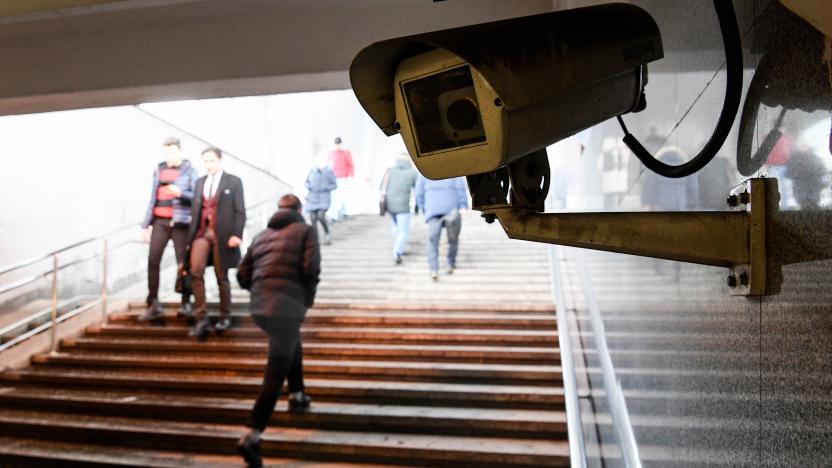immigrationandcustomsenforcement
Latest

Clearview AI wins an ICE contract as it prepares to defend itself in court
It's the sort of scenario privacy advocates feared when the public learned about Clearview.

Amazon pitched ICE on its facial recognition technology
Amazon has faced pushback, both internally and externally, for selling its Rekognition facial recognition technology to law enforcement. It's a move the company's own employees said would "serve to harm the most marginalized." Now, The Daily Beast reports that Amazon met with ICE officials in June, and it pitched the agency on Rekognition.

Microsoft employees criticize ICE contract amid recent reports
Add Microsoft to the list of companies whose government deals are provoking outrage both inside and outside their offices. The Redmond firm sparked a wave of criticism on social networks after users discovered a January blog post noting that the company's Azure cloud service team was "proud to support" US Immigration and Customs Enforcement, which has come under fire for policies that include separating children from parents. Microsoft briefly took down the post on June 18th in response, but the company has since described it as "a mistake" and replaced the content.

Homeland Security claims DJI drones are spying for China
A memo from the Los Angeles office of the Immigration and Customs Enforcement bureau (ICE) has been making the rounds and it states some pretty bold claims about drone-maker DJI. The memo, which was apparently issued in August, says that the officials assess "with moderate confidence that Chinese-based company DJI Science and Technology is providing US critical infrastructure and law enforcement data to the Chinese government." The LA ICE office also says that the information is based on, "open source reporting and a reliable source within the unmanned aerial systems industry with first and secondhand access."

ICE insists it doesn’t use Stingrays to track undocumented immigrants
In a letter (PDF), the acting director of the Immigration and Customs Enforcement (ICE) said that the agency doesn't use its Stingray mobile call-intercepting devices while enforcing immigration laws. It does deploy them when pursuing criminal suspects, however, and individual agents might use them while acting in a joint task force with other federal officers.

Twitter sues feds over attempt to identify anti-Trump account
Twitter is suing the government to resist giving up the identity behind @Alt_uscis, an account tweeting out anti-Trump messages. The account is allegedly run by rogue members of US immigration agencies. The social media titan has brought suit against the feds in order to stop the summons.

Feds are using Palantir's tech to root out immigrants
Immigration and Customs Enforcement (ICE) has yet another tool from Palantir to track and identify immigrants, according to The Intercept. Dubbed "Investigative Case Management" (ICM), it's a system that aggregates information from the Drug Enforcement Administration and Federal Bureau of Investigation. More than that, it taps into data from the Bureau of Alcohol, Tobacco, Firearms and Explosives too, to provide ICE agents with everything from biometrics, family relationships and phone records on any given person -- citizen or immigrant. These tools aren't necessarily new -- some have been around for a handful of years -- it's just that now, they're being used by the ICE rather than just the Department of Homeland Security.

US Immigration and Customs Enforcement agency planning to test BB10
Thorsten Heins' tearful late-night calls to the head of the US Customs and Enforcement Agency (ICE) seems to have done the trick. While the well-named bureau won't confirm if BlackBerry 10 has convinced it to abandon its well-publicized switch to the iPhone, it has admitted that it'll test RIM's new offering when it launches next year. Perhaps those forgetful G-Persons had their heads turned when they saw how deeply Evernote was baked into the new operating system.

Following the TSA's lead, the NTSB drops Blackberry for iPhone
According to a report in the Wall Street Journal, the National Transportation Safety Board, or NTSB, may join the growing number of government agencies that plan to ditch the BlackBerry in favor of the iPhone. A notice posted on the Federal Business Opportunities website announces that the NTSB is working with Verizon Wireless to supply iPhone 5 handsets to the agency. In a PDF justification for the "sole source" declaration regarding Verizon and the iPhone 5, the NTSB says that the agency "requires effective, reliable and stable communication capabilities to carry out its primary investigative mission and to ensure employee safety in remote locations." The agency pointed out that BlackBerry handsets "have been failing both at inopportune times and at an unacceptable rate." The NTSB noted that iPhones are the best solution going forward as they are compatible with the agency's fleet of iPads and can be supported by the existing IT and messaging infrastructure in place there. The NTSB is getting a substantial discount on the iPhone 5 handsets in consideration of the expenditures already incurred to buy BlackBerry units from the carrier. This isn't the first government group to drop the BlackBerry. Earlier this year, the Defense Department announced it was accepting proposals for an iOS or Android-based software security system for mobile devices. This contract could eventually support up to 8 million devices, says a report in USA Today. The Immigration and Customs Enforcement confirmed in September that it would switch its 17,676 mobile users to the iPhone because the BlackBerry could "no longer meet the mobile technology needs of the agency"; the Bureau of Alcohol, Tobacco and Firearms made a similar move earlier in 2012. The Transportation Security Administration also announced in May that it would drop both BlackBerry and Windows mobile devices and replace them with Apple products in a deal worth $3 million. Despite these setbacks, beleaguered RIM says it still has "1 million government customers in North America alone who depend on BlackBerry, and more than 400,000 government customers worldwide upgraded their devices in the past year." [Via WSJ and USA Today]

US Immigration and Customs Enforcement drop Blackberry for iPhone, employees get early Christmas bonus
RIM may be banking on the release of BB10 and new devices to rejuvenate the flagging brand, but the US Immigration and Customs Enforcement agency (ICE) isn't waiting around, opting to end their contract after eight years together. ICE stated that RIM "can no longer meet the mobile technology needs of the agency," and that it intends to purchase over 17,000 iPhones for its personnel at a cost of $2.1 million. Android was also interviewed for the role, but the agency decided that currently, Apple's closed ecosystem was the best choice, offering "reliable, mobile technology on a secure and manageable platform." While this isn't the first group (or likely, the last) to drop the Blackberry, we're wondering if the remaining million government customers in North America will stay loyal after this official stamp of disapproval. We imagine employees from other agencies might also care to make a case for switching -- nothing to do with free iPhones, of course.

Federal domain seizure raises new concerns over online censorship
It's been a little more than a year since the US government began seizing domains of music blogs, torrent meta-trackers and sports streaming sites. The copyright infringement investigation, led by US Immigrations and Customs Enforcement (ICE) authorities, quickly raised eyebrows among many free speech and civil rights advocates, fueling a handful of legal challenges. Few are more compelling, or frightening than a case involving Dajaz1.com. As TechDirt reports, the popular hip-hop blog has been at the epicenter of a sinuous and seemingly dystopian dispute with the feds -- one that underscores the heightening controversy surrounding federal web regulation, and blurs the constitutional divide between free speech and intellectual property protection. Dajaz1 was initially seized under the 2008 Pro IP Act, on the strength of an affidavit that cited several published songs as evidence of copyright infringement. As it turns out, ,any of these songs were actually provided by their copyright holders themselves, but that didn't stop the government from seizing the URL anyway, and plastering a warning all over its homepage. Typically, this kind of action would be the first phase of a two-step process. Once a property is seized, US law dictates that the government has 60 days to notify its owner, who can then choose to file a request for its return. If the suspect chooses to file this request within a 35-day window, the feds must then undertake a so-called forfeiture process within 90 days. Failure to do so would require the government to return the property to its rightful owner. But that's not exactly how things played out in the case of Dajaz1. For more details on the saga, head past the break.

US judge won't return seized URL to Rojadirecta.com, absolutamente no
Welcome to the homepage of popular sports streaming and p2p site Rojadirecta.com. Why all the birdy logos and harsh words about going to prison? Well, it's a convoluted story, which began when a whole bunch of sports sites -- including Rojadirecta -- were summarily seized by US Immigration and Customs Enforcement, based on "probable cause to believe" they'd been involved in copyright infringement. Awkwardly, the Spanish owners of this particular site had already been cleared of any wrongdoing by courts in Spain, but this counted for nada because their .com URL was American. So, their one hope was to convince a US judge that the seizure violated the First Amendment and should be overturned. This case won support from freedom of speech activists like the Electronic Frontier Foundation, but on Thursday it finally failed. The presiding judge ruled that no rights had been violated, because Rojadirecta could easily set up shop at a non-US address and continue to function. Bad news indeed for the Spaniards -- maybe they should move to the UK, where due process takes a whole lot longer.

US government seizes domain names, claims to have a warrant
We're all for bashing botnets, but the US Immigrations and Customs Enforcement (ICE) may have crossed a line -- in the midst of nabbing counterfeiters this weekend, the government organization seized the domains of a torrent meta-tracker and a trio of music sites. Today, the picture above is the only thing you'll see if you go to Torrent-Finder.com, RapGodFathers.com, Dajaz1.com or OnSmash.com, as the ICANN domain registration for the four are now in the ICE's possession, presumably on suspicion of piracy. If you ask the original domain owners however, they'll vehemently refute such allegations -- the torrent site reportedly didn't even distribute torrents themselves, merely cross-referenced other sites that do, and a RapGodFathers representative told TorrentFreak that it had complied with all DMCA takedown notifications. Apparently the websites and servers themselves are still intact, and it's only the URLs at stake, as two of the four websites are already up and running at domains ending in .info. We have to admit, this particular brand of domain squatting could be an intriguing business model. Expect "seized domains" to be tacked onto the laundry list of "Valuable Items You Too Can Buy at Government Auction!" any day now. [Thanks, Brian]

Console hacker arrested, faces up to ten years in jail
Just when you thought it was safe to get out your soldering irons, Immigration and Customs Enforcement wants you to know that its agents are still out there, on the lookout for for even more mod chip-wielding nogoodniks and their non-DMCA compliant consoles. According to the AP, a 27-year-old CSU student named Matthew Crippen was recently arrested for "modifying Xbox, PlayStation and Wii consoles in violation of the Digital Millennium Copyright Act" and released Monday on $5,000 bond. The dime was dropped on this perp by the Entertainment Software Association, and the raid conducted by Customs agents sometime in May. He will be arraigned on August 10th, and if convicted, he faces up to 10 years in prison. Let this be a lesson to you: while the ICE may have its hands full with human slavery, drug trafficking, transnational gangs, and stolen artifacts, there is always time to make an example out of a man that knows his way around the inside of a Playstation.









